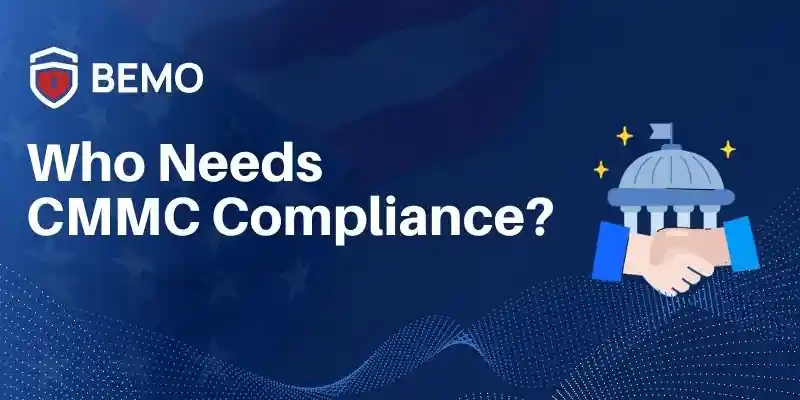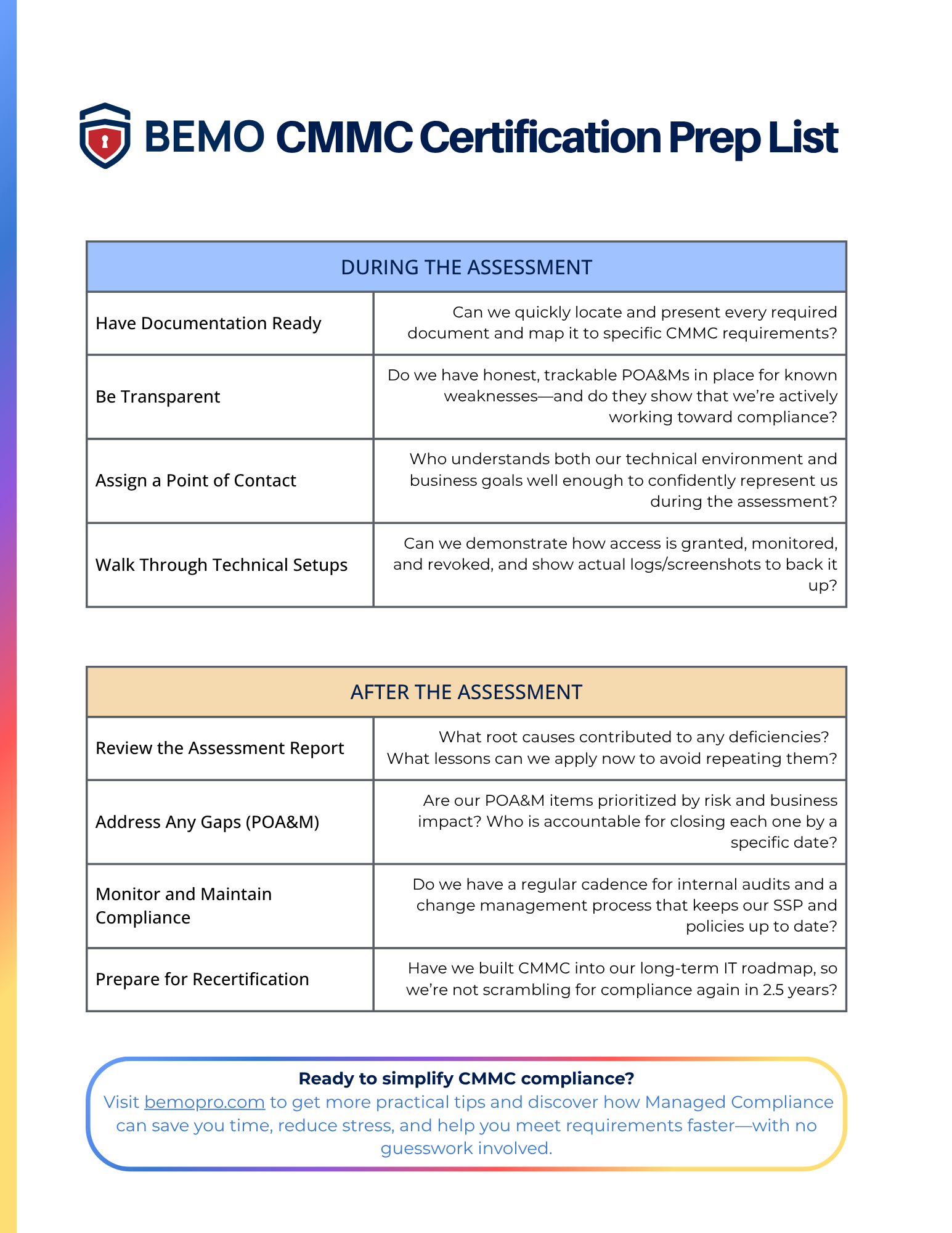
Not every business has to worry about CMMC compliance—but if your company works with the Department of Defense (DoD) or wants to, this certification isn’t optional. It’s a must-have requirement to bid on and win DoD contracts. And even if you’re a small subcontractor, you're still expected to comply.
The Cybersecurity Maturity Model Certification (CMMC) was designed to tighten the security of the defense industrial base (DIB). With rising threats and increasingly complex supply chains, the government wants to make sure that everyone—from large primes to niche vendors—meets a baseline for cybersecurity.
The good news? While CMMC may seem intimidating at first, getting certified doesn’t have to be painful.
IMPORTANT CMMC UPDATE:
As of September 10, 2025, the Department of Defense (DoD) officially completed the rulemaking process for the Cybersecurity Maturity Model Certification (CMMC) program. However, CMMC enforcement has not yet begun.
- Final Rule Published: The CMMC rule was published in the Federal Register on September 10, 2025.
- Enforcement Start Date: The rule becomes enforceable on November 10, 2025, which marks the beginning of Phase 1 of the CMMC rollout.
What Happens on November 10, 2025:
- CMMC Level 1 and Level 2 self-assessments will be required in applicable DoD solicitations and contracts.
- Third-party Level 2 assessments may be required at DoD’s discretion.
- These requirements will apply to contractors handling Federal Contract Information (FCI) or Controlled Unclassified Information (CUI).
Phased Implementation Timeline:
- Phase 1 – Nov 10, 2025: Level 1 & Level 2 (self-assessments)
- Phase 2 – Nov 10, 2026: Level 2 (third-party assessments)
- Phase 3 – Nov 10, 2027: Level 3 assessments introduced
- Phase 4 – Nov 10, 2028: Full implementation across all applicable contracts
So while the final rule is in place, actual enforcement begins on November 10, 2025. If you're preparing for CMMC compliance, now is the time to act—especially if you're targeting DoD contracts in late 2025 or early 2026.
Table of Contents
Who Needs CMMC Certification?
If your company wants to do business with the DoD—either directly or as a subcontractor—you will need to be CMMC certified. That includes:
-
Prime contractors
-
Subcontractors
-
Suppliers and vendors in the DoD supply chain
-
Managed IT and cybersecurity providers serving DoD contractors
-
Cloud providers hosting CUI for DoD-related projects
CMMC isn't just for large defense contractors. Small and mid-sized businesses make up a significant portion of the DIB and are just as responsible for securing government data. Even if you’re working on non-classified projects, if you're handling Federal Contract Information (FCI) or Controlled Unclassified Information (CUI), you’ll need to meet at least the foundational levels of the CMMC framework.
Benefits of CMMC Certification
Getting CMMC certified isn’t just about staying eligible for government contracts—it brings a range of business benefits:
Stronger Security Posture
CMMC forces you to take a hard look at your cybersecurity gaps and close them, reducing your risk of ransomware attacks, phishing, and data breaches.
Competitive Advantage
Many companies in the DIB are already preparing for CMMC, but not all are certified yet. Achieving compliance early can give you a leg up in bidding for new contracts.
Reputation Boost
Certification signals that your company takes security seriously. That builds trust with government agencies and primes who rely on their vendors to stay compliant.
Business Continuity
The controls required under CMMC can help strengthen internal processes, protect intellectual property, and prevent downtime caused by cyber incidents.
CMMC Compliance Requirements
CMMC is structured around three levels, with each level building on the previous one:
-
Level 1 (Foundational): Focused on safeguarding FCI through basic cyber hygiene practices (e.g., using strong passwords, installing updates).
-
Level 2 (Advanced): Requires implementation of the 110 security controls from NIST SP 800-171, covering the protection of CUI.
-
Level 3 (Expert): Aimed at the highest-priority DoD programs, building upon Level 2 with additional practices to fend off advanced persistent threats (APTs).
Depending on your contract type and whether you handle CUI, your organization will need to meet the appropriate level. Certification must be done by an accredited CMMC Third-Party Assessment Organization (C3PAO) and maintained over time.
How to Prepare for CMMC Certification
Whether you’re targeting Level 1 or Level 2 certification, here’s how to approach the process step by step—before, during, and after your assessment.
We highly recommend you review the following checklist with key questions designed to help you better understand the real-life usability of our approach to CMMC—from preparation all the way through post-compliance.


Before the Assessment: Get Ready
1. Determine Your Required CMMC Level
Start by reviewing your existing or target DoD contracts. Do they involve Federal Contract Information (FCI) or Controlled Unclassified Information (CUI)? This determines whether you need Level 1 or Level 2 compliance.
2. Conduct a Gap Analysis
Compare your current security posture against the requirements of your desired CMMC level. A formal gap assessment will show where you're falling short.
3. Build a System Security Plan (SSP)
This living document outlines your IT environment, implemented controls, and how you manage risk. It’s one of the first things an assessor will review.
4. Develop Policies and Procedures
You’ll need written policies for access control, incident response, encryption, training, and more. These documents should align with CMMC practices.
5. Begin Technical Remediation
Close security gaps by deploying required tools and controls—think multi-factor authentication (MFA), endpoint detection and response (EDR), audit logging, and secure backups.
6. Train Your Team
Human error is still the #1 cause of breaches. Provide security awareness training and ensure employees understand their role in protecting sensitive data.
7. Engage a Registered Provider Organization (RPO)
An RPO can guide you through the prep work so you don’t waste time guessing what’s important or miss critical requirements.
During the Assessment: Show Your Work
1. Have Documentation Ready
Your assessor will request your SSP, Plan of Action & Milestones (POA&M), policies, and evidence that your controls are implemented and operational.
2. Be Transparent
If there are areas where you're still improving, don’t try to hide them. Instead, provide clear action plans and timelines to demonstrate accountability.
3. Assign a Point of Contact
Choose someone internal (or work with your RPO) to act as the liaison during the audit. This streamlines communication and reduces confusion.
4. Walk Through Technical Setups
Be prepared to demonstrate how systems are configured, who has access, and how you monitor activity. Screenshots, logs, and access records go a long way.
After the Assessment: Maintain & Improve
1. Review the Assessment Report
Your assessor will give you a score and identify any issues. Take time to understand the results and how they impact your compliance level.
2. Address Any Gaps (POA&M)
If you didn’t meet all the requirements, work through the Plan of Action & Milestones to remediate and request a follow-up if needed.
3. Monitor and Maintain Compliance
CMMC isn’t one-and-done. Maintain strong cybersecurity practices, perform internal audits, and update your SSP as your systems evolve.
4. Prepare for Recertification
CMMC certifications are valid for three years, but staying compliant is an ongoing effort. Set up recurring reviews, testing, and updates to avoid last-minute scrambles next time.
How BEMO Helps You Get CMMC Certified
Getting CMMC certified can feel like a lot—especially if you’re a small business without a dedicated compliance team. That’s why BEMO offers end-to-end support to take the guesswork out of the process. We’ve helped many companies navigate frameworks like CMMC, SOC 2, and ISO 27001, and we know how to keep it efficient, affordable, and stress-free.
Here’s how we help at every stage of your journey:
Readiness Assessment & Gap Analysis
We’ll evaluate your current security posture against your required CMMC level. Then we’ll deliver a tailored action plan, prioritizing high-risk areas and quick wins.
Remediation and Implementation Support
We don’t just hand you a list of what’s missing—we help you fix it. Whether it’s deploying tools like MFA, EDR, or backup solutions, we guide your technical team (or implement it for you) to ensure compliance.
Policy and Documentation Development
We’ll create or refine your System Security Plan (SSP), security policies, and procedures—customized to your environment and aligned with CMMC standards. No templates. Just real, audit-ready documentation.
Security Awareness Training
We provide ongoing user training to reduce risk and help your team stay alert to social engineering, phishing, and insider threats.
Ongoing Security Monitoring and Maintenance
With BEMO’s Managed Security and Compliance services, you get 24/7 monitoring, alerting, and response. That means fewer gaps and less stress when it’s time for recertification.
Audit Preparation and Support
We’ll coach you through the assessment process and help you gather and present the right evidence. If issues arise during the audit, we’ll be right there with you to explain your controls and remediation path.
Long-Term Compliance Partnership
Once certified, staying compliant is a continuous effort. We help you maintain your compliance posture with ongoing risk assessments, system reviews, policy updates, and support for recertification cycles.
Want to take the next step toward CMMC certification without the overwhelm?
Let's talk, you'll see how BEMO makes compliance manageable for small and midsized defense contractors.
Is CMMC Certification Worth It for Your Business?
If you want to keep or win DoD contracts, the answer is yes. Without it, you simply won’t qualify. But beyond compliance, CMMC helps you build a stronger, more secure business—something that benefits your operations, your customers, and your bottom line.
Even if you’re unsure whether you’ll continue working with the DoD, achieving CMMC can serve as a long-term investment in your company’s credibility and cybersecurity maturity.
FAQs About CMMC for Small Business
What is the difference between CMMC and NIST 800-171?
CMMC builds on NIST 800-171 but adds accountability through third-party assessments and certification. We've detailed a n apples to apples comparison in our article "CMMC vs NIST 800", go check it out.
How long does it take to get certified?
That depends on your current cybersecurity maturity. For small businesses starting from scratch, the process can take up to 12 months.
Is CMMC certification expensive?
Costs vary based on your environment and which level you’re targeting. Working with a partner like BEMO can help reduce unnecessary expenses and speed up the process. If you want to see a breakdown example of costs involved in this process read our article "How Much Does CMMC Certification Cost?"
What happens if I fail a CMMC audit?
You won’t be eligible for DoD contracts until you pass. However, you can work on remediations and reapply.
Can I get help with the technical side of things?
Yes. BEMO offers Managed Compliance and Managed Security services that take care of everything from endpoint protection to documentation and compliance monitoring.
Need help getting started with CMMC?
Book a free consultation with BEMO and let’s map out your compliance journey together.
Top 10 Posts
-
Google Workspace to Office 365 Migration: A Step-by-Step Guide
-
Office 365 MFA Setup: Step-by-Step Instructions
-
How to Migrate from GoDaddy to Office 365
-
Migrate From Gmail to Office 365: 2024 Guide
-
CMMC Meaning : A Comprehensive Guide for Startups
-
How to remove Office 365 from GoDaddy (tips and tricks)
-
What is Microsoft Purview ? Your A to Z Guide to Getting Secure Fast
-
What is The CIA Triad?
-
How to Set Up Office Message Encryption (OME)
-
What are the 4 types of Microsoft Active Directory?


Leave us a comment!